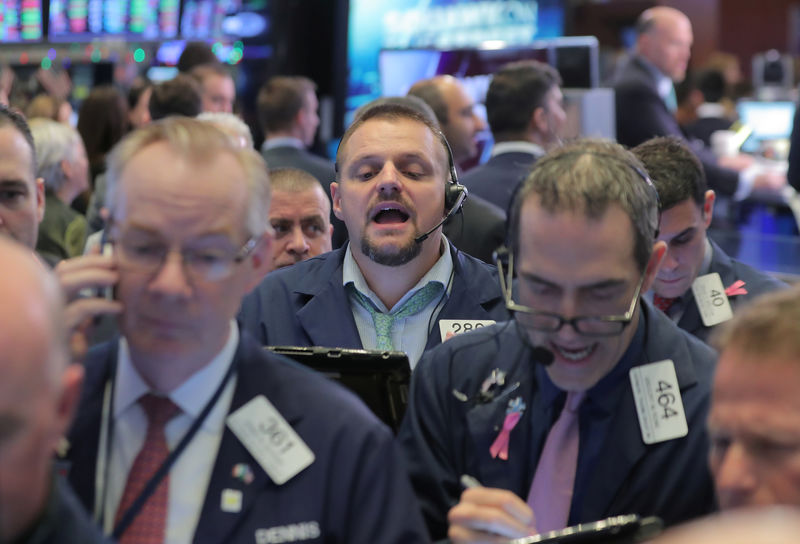 © Reuters. Traders work on the floor of the NYSE in New York
© Reuters. Traders work on the floor of the NYSE in New YorkBy Karin Strohecker
LONDON (Reuters) – Concerned about the health of the global economy, international investors boosted allocations to safe-haven cash in November to the highest levels in almost two years, while further trimming equity exposure, especially in the United States.
Following a brutal October, world stocks bounced in early November but ceded those gains later in the month as tech stocks were routed and oil prices tumbled. November was the worst month for iPhone maker Apple (O:) and for Brent crude futures () since the 2008 financial crisis.
Ructions in the run-up to Britain’s March 2019 departure from the European Union, Italy’s budget-linked standoff with EU authorities and U.S.-China tensions over trade are also pressuring markets and threatening to slow world growth.
Fund managers around the globe reduced their exposure to equities to 47.7 percent from 47.9 percent in October – the lowest level since July, according to Reuters’ monthly asset-allocation poll of 47 asset managers conducted on Nov. 15-29.
Fixed income holdings rose to 39.3 percent, a touch higher than October, while cash levels – a key gauge of investor caution – rose to a 20-month high of 5.6 percent. Cash holdings have risen almost 2 percentage points since the start of 2018.
“After a bounceback, equity markets slipped again in November as growth concerns remain, and so do political uncertainties,” said Cédric Baron, from the multi asset strategies team at Generali (MI:) Investments Partners.
Economic slowdown in the United States and China, the world’s top two economies, ranked high on the risk list of investors. All eyes now are on this weekend’s meeting of the G20 bloc of nations’ leaders, especially on a high-stakes encounter between U.S. President Donald Trump and his Chinese counterpart Xi Jinping.
“This meeting should set the tone for risky assets until the end of the year,” Baron added.
Across equity portfolios, fund managers cut back on U.S. stocks after holdings hit the highest level in at least five years in September. Holdings of euro zone and Japanese equities also fell as fund managers shifted into stocks in emerging Asia and Britain.
Fixed income allocations mirrored some of that geographic pattern, with holdings of U.S. and euro zone bonds reduced in favor of British and Japanese debt.
While U.S. and European government bonds have held up well over the past month, corporate bonds have come under pressure as investors are concerned over economic growth and the impending end of bond purchases by the European Central Bank.
Corporate bonds across the bloc sold off sharply in November, with the average yield on European cooperate debt rising to 2-1/2 year highs. .IBBEU003D>
“Global bond markets have been influenced by all of the variables surrounding central bank policies, in the U.S. the Fed seem to be stalling,” said Peter Lowman, CIO at Investment Quorum.
Data has confirmed U.S. economic growth slowed in the third quarter, with momentum likely moderating further early in the fourth quarter. Meanwhile numbers from the euro zone showed the bloc’s economy grew at its slowest pace in four years in the third quarter.
Fund managers were undecided if the ECB will be forced to shelve ambitions to hike interest rates next year. Around 55 percent expect no increase in 2019, while 45 percent predict policy makers will plough ahead and deliver the bloc’s first rate hike since 2011.
Looking ahead to 2019, many fund managers forecast emerging market equities could be in for a rebound.
The sector has been hammered in 2018, due to rising U.S. interest rates and crises in Turkey and Argentina. MSCI’s emerging stock market index () have tumbled more than 14 percent since the start of the year.
Source: Investing.com





























